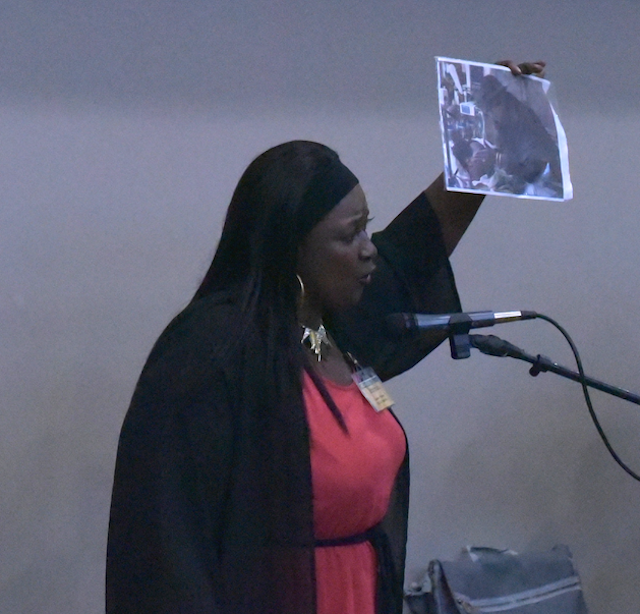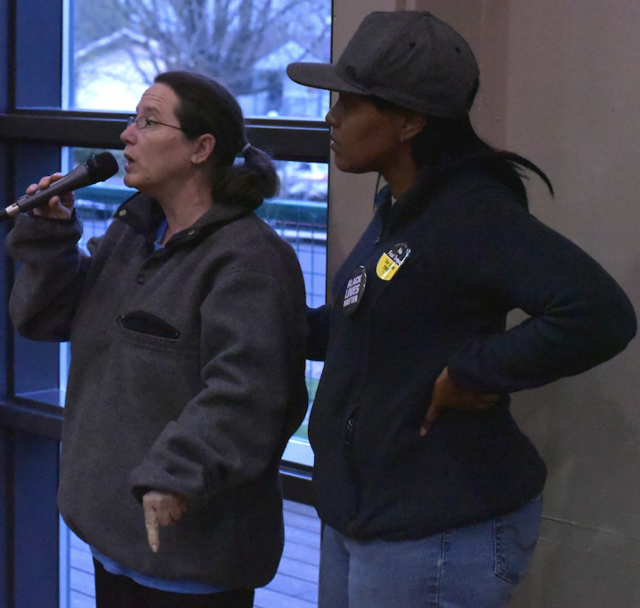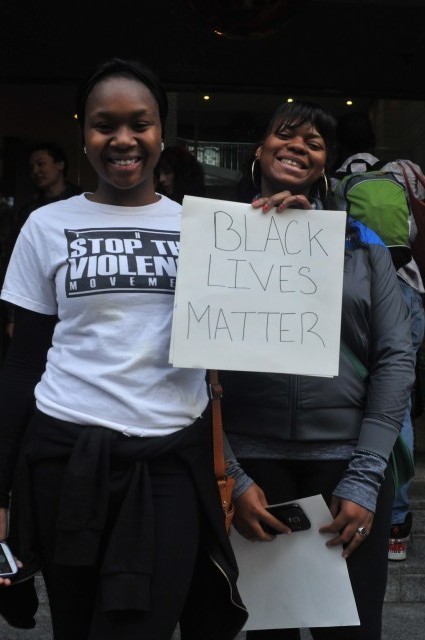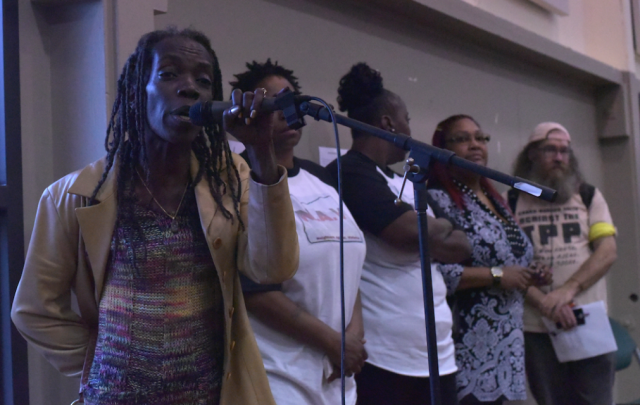Story and photos by Pete Shaw
Interest is running high in the Community Oversight Advisory Board (COAB), which convened its inaugural meeting on April 2 with over 200 people in attendance. The COAB, according to the terms of the settlement agreement between the Department of Justice (DoJ) and the City of Portland will “gather input in the form of public and written comments on the Portland Police Bureau’s (PPB) community engagement and outreach efforts.” The agreement is the product of a DoJ investigation into the PPB’s interaction with people who are or appear to be mentally ill.
Originally, the DoJ had been asked to examine the PPB’s relationships with communities of color, particularly the Black community in Portland. The DoJ chose otherwise, concluding that the PPB had “engaged in an unconstitutional pattern or practice of excessive force against people with mental illness.” Also included in the report was a section finding problems with the PPB and communities of color, with “the most prevalent concern…the often tense relationship between PPB and the African American Community.”
If the DoJ investigation in Portland largely eschewed a look at that relationship, public response to police violence–particularly since Ferguson police officer Darren Wilson killed Michael Brown and subsequently was not indicted–has predominantly focused on PPB’s interaction with Black people. Very clearly, the majority of the crowd attended the COAB meeting at New Columbia rIlla to discuss that issue.
It took some time to get there, though. The schedule showed the first hour given over to the PPB. No doubt some would argue it’s only fair that police should be given time for their side of the story, despite the fact that their story gets told every day. Those voices seem to be the same ones that find no irony in questioning why we don’t have a white history month.
Nonetheless, the show went on. First, Captain Mike Marshman, who stated he is charged with making sure the settlement agreement is fulfilled by the police, spoke about how important it was to him and the PPB that they build trust with the people of Portland, saying that if that trust could not be created, then all other aspects of the settlement agreement would “lose validity.” He referred to Portland’s police officers, particularly those on patrol, as “front line ambassadors.”
Sergeant Pete Simpson, Public Information Officer for the PPB–who came to this public hearing in full uniform, including a gun–then launched into about 45 minutes of what can only be described as police propaganda. First, Simpson spoke about the long reach of the PPB on social media, telling how it has over 46,000 Twitter followers, 14,000 “likes” on Facebook, and is “consistently rated as one of best (police departments) in using social media.”
He also talked about how the PPB was responding to people, particularly young people, getting more of their news from social media. Simpson said the PPB now sends news releases that he described as “unfiltered information” directly over social media. Of course, the question is not whether the information is filtered–although history shows it usually is–but if it has any bearing on reality.
 The point of propaganda is to alter the reality of those who view it. Simpson then outlined some of the PPB’s programs aimed at dispensing its version of truth, which is basically an inversion of the rotten apple analogy. In this case, Simpson was trying to show individual officers, representing the PPB as a whole, as everyday folks who serve and protect with a smile, creatures of grace who would never hurt a fly except in the name of serving and protecting the community. The presentation disturbingly resembled something a religious holy roller might produce to show what awaits people in the next life if they just listen to, believe, and follow him.
The point of propaganda is to alter the reality of those who view it. Simpson then outlined some of the PPB’s programs aimed at dispensing its version of truth, which is basically an inversion of the rotten apple analogy. In this case, Simpson was trying to show individual officers, representing the PPB as a whole, as everyday folks who serve and protect with a smile, creatures of grace who would never hurt a fly except in the name of serving and protecting the community. The presentation disturbingly resembled something a religious holy roller might produce to show what awaits people in the next life if they just listen to, believe, and follow him.
He told the crowd of the amazing, if unlikely, success story of footage from the dashboard of a Portland police car that went viral on the internet, gathering over 3 billion views and exciting interest even from Pakistan. The video was of a mother and her ducklings crossing the highway.
He also talked about many people enjoying a photo snapped after two police, who had responded to an accident involving a pizza delivery person, delivered the pizza themselves. There was no mention of how many Portland mothers are less a duckling due to violent actions of the police. No mention that for many Black people, two cops at their door is a sight of terror.
Simpson then showed a series of PPB videos that further buttressed his agenda of presenting the PPB as bathed in good and kind light. One showed Portland police officers of various ethnicities, trumpeting how the PPB lets them retain their uniqueness even as they all work together to serve and protect Portland. Another showed LGBT members of the PPB involved with the “It Gets Better” campaign.
Still a third one emphasized that police are “good people.” In the photos that went with the song “Good People” by Great Big Sea, a tune that would have fit well in a documentary about the Laurel Canyon scene in the early 1970s, police were smiling and having fun in the community. In no way would you guess that these officers are part of an institution that throughout the country is helping kill 1 Black person every 28 hours. The only thing these PPB officers would get in trouble for would be for spreading too much joy.
Finally, a video on the “Your City, Your Police” campaign that began as a collection of 3 billboards–donated by Clear Channel for $200 until it could sell the space–in 3 neighborhoods showing an officer from there who now patrols there. The video followed an Officer Jones, trained to help people having mental crises, as he patrolled. At one point he said, “We’re not something to be feared…We’re here to help them through a crisis, despite all these intimidating tools I wear.”
Simpson said when one kid told him, when seeing a billboard, “that person grew up in this neighborhood, and now they’re protecting it, and that’s cool,” for him “that was a home run.”
Every one of these pieces not only served to glorify the Portland police, but also to individualize police and cast a wall between the “good” cops and the bad ones. They completely missed the point–willfully, it would seem–that the problem is with the police as a system. This is not about good apples. It isn’t even about bad apples. It is about a rotten barrel. But it is effective propaganda: throughout the night, much of the testimony made a division between good officers–some even called “heroes” by those who were livid with the PPB’s behavior–and bad ones.
 Someone else from PPB was scheduled to speak after Simpson, but crowd members pointed out that time was nearly up. Instead, about 8 people in the audience immediately came forth to sing the praises of the PPB–this too was apparently part of the time allotted to the PPB–including a representative from the Portland Business Alliance (PBA) and a minister who talked about police officers “sacrificing their lives” to make the city some sort of light on the hill.
Someone else from PPB was scheduled to speak after Simpson, but crowd members pointed out that time was nearly up. Instead, about 8 people in the audience immediately came forth to sing the praises of the PPB–this too was apparently part of the time allotted to the PPB–including a representative from the Portland Business Alliance (PBA) and a minister who talked about police officers “sacrificing their lives” to make the city some sort of light on the hill.
As that minister spoke, the crowd showed its restlessness for what by that point had long descended into a showpiece for the Portland Police Bureau instead of what it was intended to be: a forum for the people who have to deal with the police violence found in the DoJ’s investigation. One person angrily asked, “Why are we here?” A few others added permutations of that question.
When the next speaker, a man from the Sunshine Division, praised the police for their help in administering its program, it became too much for the crowd. Shouts of “People are dying!”, “We want to hear from the public!”, and “Con job!” combined with general sounds of disdain, forcing former Oregon Supreme Court chief justice Paul De Muniz, now COAB chair, to start the public comment period–which supposedly was what the whole meeting should have been.
Teressa Raiford, lead organizer of Don’t Shoot Portland, railed against the meeting, saying she had walked into a “PR opportunity to talk about how great the police are,” a sentiment that would be echoed often through the rest of the night. Her final statement was as fair a condemnation of the meeting up to that point as one could make: “Fuck this.”
Raiford, however, did not leave. She stayed to provide support for many other people who spoke–particularly those whose children had been killed by police–and following her, nearly every other speaker made clear she had a very different view of the police than Simpson had presented. “If you are a person of color, perceived as homeless, or perceived as transgender, your experiences are different from tall white people like myself,” said James Lopez Erickson. He also noted that what was needed was seeing “the humanity of people in our community,” not police propaganda.
A woman from Vancouver, Washington said, “We cannot come together as a community when we have something in the system that says it’s okay to kill.” She later mentioned that whereas she once was not afraid of the police, she now is.
One man took the PPB’s “propaganda politics” to task, saying they were “totally one-sided.” He then noted that the police did not exist to work with most of the community. “It’s the oligarchs. That’s who the police serve and protect.” He then took forum organizers to task for having people like the woman representing the PBA to come and shill for the police. “Where is she now? She’s out of here?…I’d be ashamed if I was the people putting on the meeting.”
Two women of Neighbors Against Violence said, “We used to have Officer Friendlys, now we have Officer Kill Mes.”
“There’s a disconnect between what you say you want–real community engagement–and how you allow the community the chance to provide it…Nobody came here to hear propaganda,” said Portland NAACP president Jo Ann Hardesty.
 Earlier a woman who works at the Boys and Girls Club in New Columbia Villa had said she saw the police as helpful. Hardesty wondered if the woman knew about the 2013 case where the police arrested a 9 year old girl from New Columbia Village after allegedly shoving another girl’s head into a brick wall. The girl was handcuffed, put in the back of a police car, and taken to jail by two fully-armed police officers.
Earlier a woman who works at the Boys and Girls Club in New Columbia Villa had said she saw the police as helpful. Hardesty wondered if the woman knew about the 2013 case where the police arrested a 9 year old girl from New Columbia Village after allegedly shoving another girl’s head into a brick wall. The girl was handcuffed, put in the back of a police car, and taken to jail by two fully-armed police officers.
Roger Hardesty of Consult Hardesty talked about how “police are beating, Tazing, and killing people” and have been “lying for a very long time” about their crimes to grand juries and city government. “You can’t just jump to reconciliation without going through the truth…It’s time to take off your cloak of respectability and admit you failed in your oath to uphold the Constitution.”
“Everybody that you look at and that has the color of my skin is not a felon,” Vanessia Crawford said.
“All we see is you guys sitting on your asses, doing nothing,” said Sara of Right 2 Survive. “I don’t think police can ever have respect until the killing stops…but until then, we’re not getting anywhere.”
Reminding the COAB that it exists because the police are not acting like Simpson’s propaganda pieces would have people believe, Joe Smith, a former City attorney, declared the first 90 minutes of the night “an orchestrated event.”
Another woman spoke through a translator to tell about how her son’s car had been towed from her apartment complex despite the car having a sticker allowing him to park there. She followed the truck and was finally able to confront the driver who hit her son and insulted her. She called the police and the responding officer told her she needed to speak better English, saying that perhaps if he were to arrest her, that would help her learn. The woman said she began to fear the officer would kill her son, and the experience left her lacking that trust that Marshman had earlier said was so important. “If I had a problem now,” she said, “I don’t know if I would call the police.”
“We need to show people around the state and the country that Portlanders can dialogue with each other,” said moderator De Muniz at the start of the meeting. However, that was not the point of the DoJ settlement agreement. It was not asked to investigate whether the people of Portland are capable of dialogue. It was asked to investigate police violence, and what Portland needs to show itself is that it takes seriously the reality that PPB is a violent and racist institution that has acted with impunity in its relationship with communities of color, particularly the Black community.
Because, as one speaker so eloquently put it, no lives matter until Black lives matter.
The next COAB Public Town Hall meeting is on Thursday April 9 from 5:30 to 8:30 PM at the Montavilla United Methodist Church located at 232 SE 80th Avenue. Come make your voice heard.








7 comments for “Inaugural Community Oversight Committee Meeting Hijacked By Police Dog & Pony Promenade”